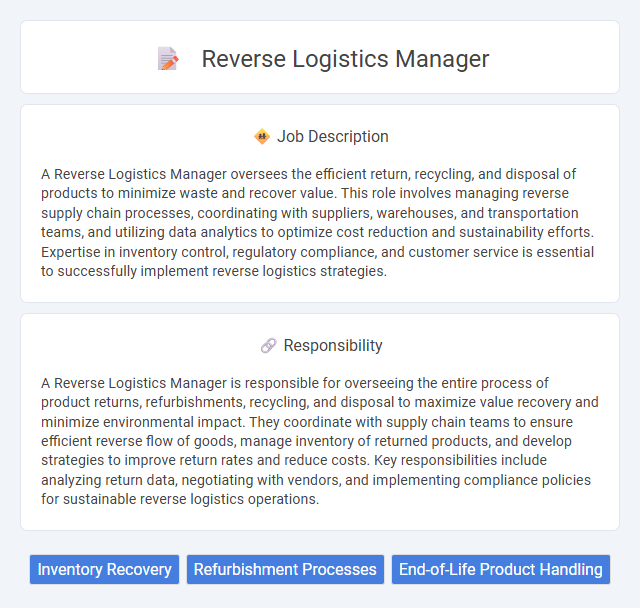
A Reverse Logistics Manager oversees the efficient return, recycling, and disposal of products to minimize waste and recover value. This role involves managing reverse supply chain processes, coordinating with suppliers, warehouses, and transportation teams, and utilizing data analytics to optimize cost reduction and sustainability efforts. Expertise in inventory control, regulatory compliance, and customer service is essential to successfully implement reverse logistics strategies.
Individuals with strong problem-solving skills and a detail-oriented mindset are likely to be suitable for a Reverse Logistics Manager role. Candidates who enjoy managing complex supply chain processes and coordinating returns or recycling operations may find this position well-matched to their strengths. Those who prefer repetitive tasks without the need for strategic thinking might struggle to thrive in this dynamic and multifaceted job environment.
Qualification
A Reverse Logistics Manager typically requires a bachelor's degree in supply chain management, logistics, or business administration, with certifications such as APICS CPIM or CSCMP preferred. Strong skills in inventory management, data analysis, and proficiency in logistics software like SAP or Oracle are essential for optimizing return processes. Experience in regulatory compliance, sustainability initiatives, and coordinating cross-functional teams enhances operational efficiency in handling product returns and resale.
Responsibility
A Reverse Logistics Manager is responsible for overseeing the entire process of product returns, refurbishments, recycling, and disposal to maximize value recovery and minimize environmental impact. They coordinate with supply chain teams to ensure efficient reverse flow of goods, manage inventory of returned products, and develop strategies to improve return rates and reduce costs. Key responsibilities include analyzing return data, negotiating with vendors, and implementing compliance policies for sustainable reverse logistics operations.
Benefit
A Reverse Logistics Manager likely enhances operational efficiency by optimizing product returns and minimizing waste. This role probably reduces costs through improved asset recovery and inventory management. Efficient reverse logistics may also increase customer satisfaction by ensuring smooth return and refurbishment processes.
Challenge
The role of a Reverse Logistics Manager likely involves navigating complex supply chain challenges, such as efficiently managing product returns and minimizing waste. It may require strategic problem-solving to optimize the flow of returned goods while balancing cost control and customer satisfaction. The position could demand continuous adaptation to evolving regulations and sustainability goals within the logistics framework.
Career Advancement
A Reverse Logistics Manager oversees the efficient return and recycling of products, optimizing supply chain processes to reduce costs and environmental impact. Mastery in data analysis, inventory management, and sustainability initiatives drives performance improvements and prepares professionals for senior roles such as Supply Chain Director or Operations Manager. Continuous skills development in technology integration and strategic planning enhances career advancement opportunities within global logistics networks.
Key Terms
Inventory Recovery
A Reverse Logistics Manager specializing in Inventory Recovery optimizes the process of reclaiming, refurbishing, and redistributing returned or excess products to minimize waste and reduce costs. This role involves analyzing return rates, coordinating with warehouses and suppliers, and implementing strategies to maximize asset recovery and inventory turnover. Effective inventory recovery enhances sustainability efforts and improves overall supply chain efficiency by converting returns into valuable assets.
Refurbishment Processes
A Reverse Logistics Manager oversees the management and optimization of refurbishment processes to maximize product lifecycle value and minimize waste. They coordinate the inspection, repair, and reconditioning of returned goods, ensuring adherence to quality standards and cost-efficient workflows. Expertise in inventory management, supply chain coordination, and sustainability practices is critical to enhancing refurbishment cycle efficiency and driving circular economy initiatives.
End-of-Life Product Handling
A Reverse Logistics Manager specializing in End-of-Life Product Handling coordinates the efficient return, recycling, and disposal of products at the conclusion of their lifecycle to minimize environmental impact and reduce costs. This role involves developing sustainable processes for inventory recalls, refurbishments, and compliance with regulatory standards related to waste management and hazardous materials. Expertise in reverse supply chain optimization, waste diversion strategies, and collaboration with recycling vendors ensures maximum recovery of value and sustainability in product disposition.
 kuljobs.com
kuljobs.com